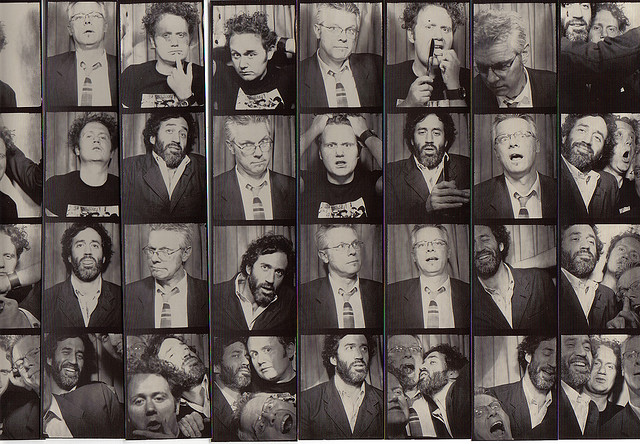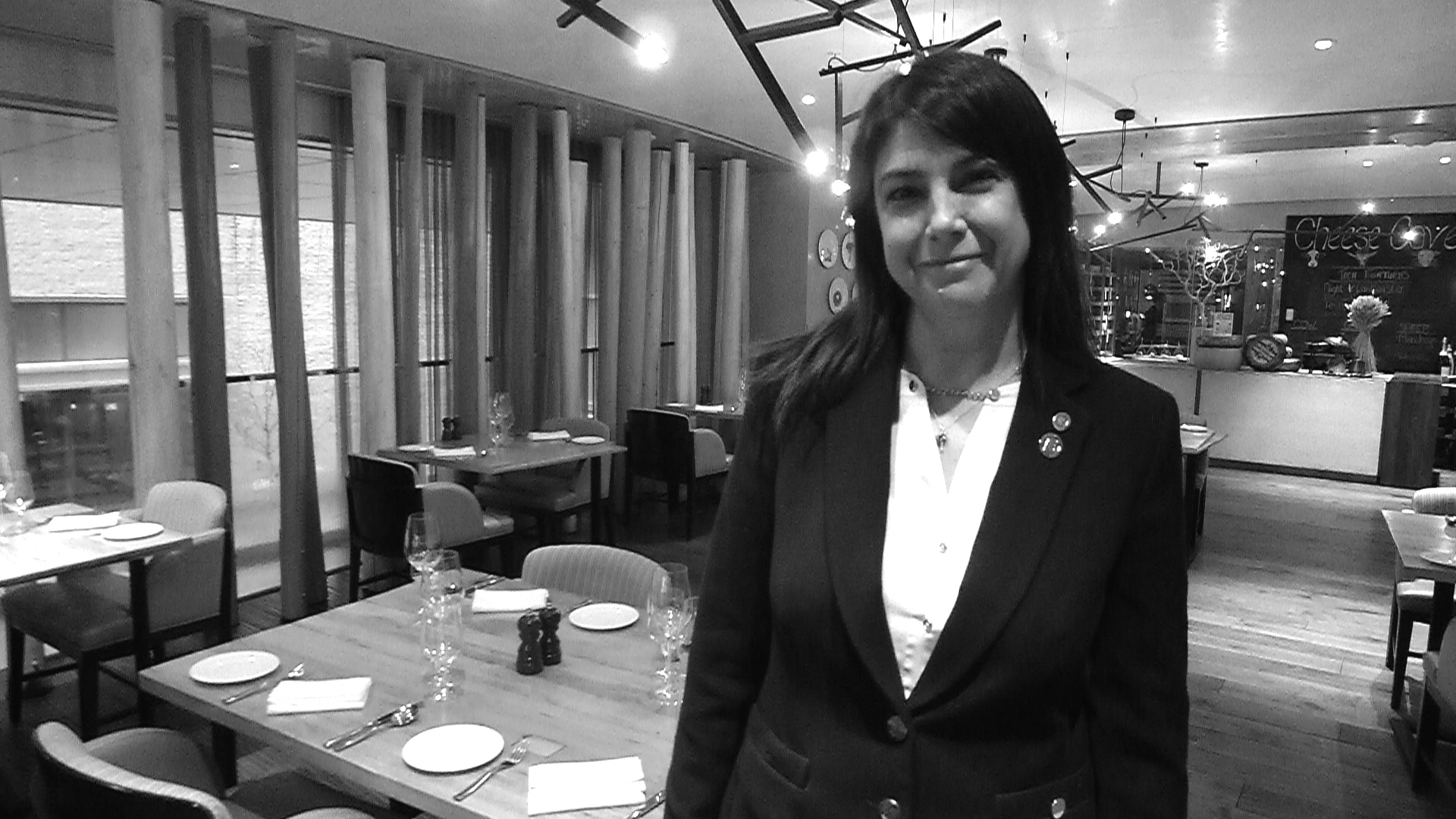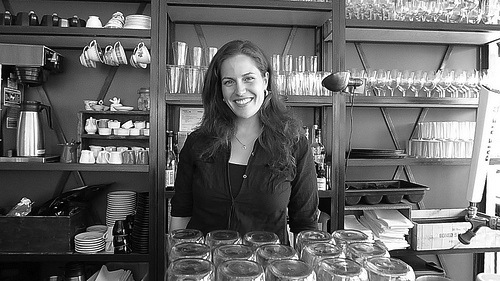In the first of a twentieth (and wildly popular) series, we interview some of the most talented up-and-coming Sommeliers in Ontario.
A few years back I was flicking through the pages of a locally published periodical and noticed that when it came to Sommeliers it was the same names that seemed to pop up over and over again. I was also becoming gradually cognisant of the fact that we more established wine folks were well and truly “losing our edge” to these young blood Sommeliers. Being well aware of the depth of new talent that was out there I finally decided to get together with a couple of fellow Toronto Sommelier “Old Guard” (Anton Potvin and Peter Boyd) to assemble a line of questioning that would give us an entertaining insight into the minds of these rising and often underexposed stars.
This time around we speak with Sommelier Tim Reed Manessy, albeit over the course of almost 18 months… This one has been a long time coming, but I honestly feel it has turned out to be well worth the wait.
Good Food Revolution: So Tim, what is it that you are doing these days?
Tim Reed Manessy: A little bit of this, a little bit of that. Trying to cobble together a life in the wine business as most of us are. I’m lucky enough to have my position at The Living Vine as my core gig, which gives me some stability to keep teaching and exploring other opportunities that may not be as lucrative.
GFR: And what kind of experience and training wine-wise did you have before doing what you do today?
TRM: I worked in restaurants for 15 years, from busboy up and have held every FOH position there is. When I fell in love with wine, after a couple of general courses, I pursued my CAPS and CMS certifications.
GFR: How would you describe your role at The Living Vine?
TRM: Primarily sales, though we’re a small company, so we all pitch in to help with the big picture. It’s actually a great compromise, because it keeps us invested in the success of the business as a whole, instead of becoming fixated on our own narrow sales successes. I think it’s a more holistic approach to a sales position.
GFR: How is it working with Mark Cuff?
TRM: He’s the best. I can’t say enough positive things about him, though I’m sure you’ve heard similar things from pretty much everyone in our industry. I never saw myself in wine sales and I really only gave this job a chance because of Mark as a human (having known him for several years prior) and the quality of the portfolio. He’s built a pretty incredible business and continues to impress by structuring us laterally, giving us unlimited opportunities for input and support to pursue anything that drives us inside and outside The Living Vine.
GFR: Yes… he’s a pretty special guy… I notice that you share his taste in Birkenstocks.
You mentioned your teaching… is this something that you would like to continue with and expand? What do you find most satisfying about this? And what frustrates you most?
TRM: I will never stop teaching; it’s easily the most rewarding thing I do. That sounds like a cliché, but let me elaborate, because it’s not. I would say the reward is twofold, and it won’t surprise you to learn that one of those things is NOT the money. The first thing is, because I teach Continuing Education, the students that take these courses are there out of pure passion. There are very few that are wine-or-related industry folks just going through the motions – every one of them is there because they love drinking wine, talking about wine and learning about wine. You can’t ask for more as a teacher.
Secondly, I’ve been with George Brown College for more than five years now, and they have just been unbelievable in terms of support, resources and opportunity to participate, coordinate and collaborate on world-class wine events, meet global wine superstars and generally enrich my wine experience and broaden my network in a way that would have been nearly impossible without them. The only frustrating part is not having enough time to dedicate to the evolution of our Continuing Education programme and continue to engage students and professionals in new and exciting ways. I hope to have a greater focus on this in the future, but I’m afraid we’re talking in the 10-20 year plan.
GFR: Coming from a restaurant background, and spending some time in management, what’s your whole take on the whole tip argument? I’ve never been part of the tip pool as I have always been in management, or in a private club with no tips. In my mind the tip system in north america is completely broken… and then we have the minimum wage aspect! A veritable knot of vipers. A huge subject, I know, but I would be interested to hear your thoughts.
TRM: Yikes, yeah, it’s a big subject. I mean, I think the sides are obvious? On one hand, restaurant service staff are often extremely knowledgeable and talented people that deserve to make a comfortable amount of money to live in this ridiculously expensive city, support families and have a high quality of life. On the other side, the consumer is literally shamed into tipping outrageous amounts on already-overpriced services/goods (wine in particular) and in circumstances that frequently don’t warrant a tip at all (like takeout, poor service, scary taxi rides and delivery pizza).
If the consumer is already paying 13% tax to support the greater social project, plus inflated prices to ensure the owners are profitable and small businesses remain viable (the biggest piece of the anti-minimum wage argument), should they be directly supporting every individual at that establishment on a voluntary basis as well? Isn’t their patronage enough? But often, these individuals are underpaid, overworked and have skills and knowledge that far surpass that of many other respected professions. Yet they get no respect, their parents deride their choices due to social stigma around the industry, they almost never have a benefits package, still have to touch your sucked-on chicken wing bones a hundred times a day and mop the floor at 4am. So…yeah, I’m pretty torn about the whole thing.
I do believe that a tip pool system is healthier for the staff because it discourages mercenary behaviour and creates a more team-driven atmosphere. Though many service staff will accuse tip pools as an easier way for management/ownership to skim money, it can be done in a transparent way. I don’t have the answer to fix the bigger ideology though. Anecdotal evidence from around the world suggests abolishing tipping will create universally poor/unprofessional service. But my experience in Toronto under the current system? It feels like more than half the time, I’m inconveniencing my server in order to give them 20% of my bill. While I have had many service experiences that made me feel wonderful and were worth every penny, the condescension, pretension and apathetic baggage that some people carry has to go.
GFR: Now, how do I word this? Have you drunk the “Natural Wine Kool Aid”?
I’m just kidding, kind of… I’m sick fed up of “natural wine” zealots with nothing but derision for those who feel otherwise. Saying that, I do feel that there are some astounding “Natural” wines out there, so don’t get me wrong. How do you feel about the scene? … perhaps I just have a very low tolerance for volatile acidity, I don’t know… but there is some right old crap out there.
TRM: Another subject hitting pretty close to home here, Jamie. Yes, of course, I’ve consumed all of the Kool Aids. I’ve Ross Tested all of the mousy, volatile, my-kids-fingerpainted-this-label wines that I could get my hands on. And for a while, I loved every sip.
GFR: And how would you say that your palate has evolved? You mentioned that perhaps you were become more conservative in your wine tastes than you once were?
TRM: Yes, but let me put it a different way. I remember the first time I had a Californian Château-two-by-four, outrageously oaky Chardonnay with 18 g/L RS. I thought this was, quite literally, the most delicious liquid I had ever put in my mouth.
I remember years later, tasting a Corbières that was so brett-ridden that they might as well have macerated a post-race horse in the fermenter – and I LOVED it.
A Sagrantino di Montefalco that was so tannic, after swishing it around, my lips were so Velcroed to my gums that I couldn’t close my mouth completely and it came trickling down my chin. And that was amazing, too.
But today, I can’t say I enjoy these styles of wine. That doesn’t mean they are faulted or objectively bad; there are lots of people that love these things. Or perhaps they will love them for a while and will move on to the next palate-scintillating experience they come across.
“Natural” wine is an immeasurably important movement in our industry, first and foremost because it is an exploration to the extreme world of little-to-no intervention winemaking. And with that extreme comes new and exciting aromas, textures and sensations. Secondly, the ideology around natural wine is breaking down what remains of the old wine institutions defined by exclusive clubs, stuffy sommeliers and unaffordable unicorn wines. The focus of natural wine is, ostensibly, wine for the people: chuggable, glou glou, smashable, easy going, you-don’t-need-to-be-a-sommelier-to-enjoy-this wine. Which is super.
That said, I’m seeing some major challenges. I think flag-waving for a cheap-and-cheerful wine movement is lovely, but many aren’t so cheap. And there’s the growing problem of THP [mouse taint/mousiness], which I would argue is more akin to TCA [cork taint] in terms of it being an objective fault – specifically contrasting it with your example of VA [volatile acidity] or brettanomyces, which are frequently cited as appreciable in varying amounts based on personal taste.
But to finally answer your question, the problem for me is the homogenization of wine styles. While I love that people are feeling less like they need to go to school to drink wine, I have always believed that wine is unique as a beverage because we can appreciate it on an hedonistic AND intellectual level. In the same way that the Robert Parker movement of the preceding 25 years created a loss of varietal character and a lack of terroir by over-ripening, over-extracting and over-oaking, I would argue the natural wine movement is masking these things also, with wacky blends, reduction, VA and miscellaneous (bacterial?) funk. And this makes sense too – the wine world is coming into balance. We’re just seeing the pendulum swinging all the way to the other side before we return to a more moderate centre. I personally find myself gravitating towards yes, low-intervention wines, but those that speak of the grapes that went into them and the places they are from. Perhaps, in our current climate, that makes me a wine conservative. But I, like everyone else, am just drinking what I enjoy.
GFR: What makes for a good agent/supplier/merchant in your mind?
TRM: Passionate, easy to work with and a broad and interesting portfolio.
GFR: And what makes for a bad agent/supplier/merchant?
TRM: Inattentiveness or pretension of any kind.
GFR: How do you feel about Canadian wines?
TRM: Patriotic. But also objectively, very good.
GFR: What do you think that we do well here in Ontario?
TRM: I don’t think we know what we do well, yet. I mean obviously, we are already making world-class Riesling, Chardonnay, Pinot Noir, Gamay and Cabernet Franc. But I’m most interested in seeing what’s possible with other cool-to-moderate climate varieties from Central and Northern Europe.
GFR: And what do you feel we should really give up on?
TRM: Maybe nothing? With climate change, we’re seeing a greater ability to consistently ripen Cabernet Sauvignon and Merlot. But that said, the suitable areas for Cab are tiny and Merlot is still getting destroyed every time we have a cold winter.
GFR: How do you feel about restaurants support of our local industry?
TRM: It’s still half-hearted. Restaurateurs and sommeliers are quick to blame the ignorance of the wine-drinking public and the lingering stigma around the quality of local wines for the poor representation on their lists. I would guess that there is lower percentage of Ontario wines on Ontario wine lists than any other wine growing region in the world. And that’s ridiculous. The industry needs to continue to take the lead on consumer education (but do it without pretension or condescension).
GFR: Just as there is from everywhere in the world, there is quite a lot of dreadful wine coming from Canada (BC, Ontario et al.) also. How do you feel about the issue of people simply promoting something because of it being local, and not because of its quality?
TRM: That’s silly. We have hundreds of quality options that also happen to be local/Canadian. The real problem are pricing and value ratio. From a value ratio perspective: we know it’s expensive to make wine in Canada and even more expensive to get it from province to province, but it’s often a difficult comparison for consumers to make when $25 will get you so many quality options from Italy, France (or really any region except California), but only a handful of Canadian wineries are making remarkable sub-$25 wines. (Perhaps worse is the number of totally undrinkable garbage wines that are $20-$25 dragging down the average experience!) Often, notable Canadian wines are $30 – $50 and that’s not a price band that most consumers explore, or if they do, they’re buying foreign because of the reputation of these more mature growing areas. The other sticky part is pricing. With the standard restaurant markups in Toronto exceeding 300%, high-quality Canadian wines are often pushed (way) out of the average diner’s budget.
GFR: How aware of wine were you whilst growing up? Were you around wine from an early age?
TRM: My parents and extended family usually drank wine with meals, but it didn’t register as relevant to me whatsoever until I started working in restaurants.
GFR: Can you remember your first taste of wine?
TRM: Nope.
GFR: When do you feel children should be introduced to the wonderful world of wine?
TRM: There are lots of creative ways to get kids engaged in the intellectual elements of wine long before they should be consuming alcohol. I suppose it depends on the passion level of the parents. I do believe that there is an evolution of taste in food that can be put on the right track by early exposure and wine is no different.
GFR: When did you first decide that you would like a career in wine?… and was it with a view to being a Sommelier yourself?
TRM: It was a way to build skills to continue to grow in the restaurant industry. I was mostly just trying to beef up my resumé when I accidentally fell for wine.
GFR: So who or what gave you your first insight into the world of wine?
TRM: I got into craft beer first – relatively early in Ontario terms. I was super excited by different styles of beer and which ingredients or brewing methods made them unique. Somewhere in there I realized wine has all of those elements with a greater emphasis on geography, history and culture and I was hooked.
GFR: The Sommelier world is notoriously full of pretentious arseholes, and after seeing that film Somm a few years back I still worry about the emergence of a new Wine Bro culture… also, I recently picked up on a LOT of that from the mixology crowd, full-on Jordan Peterson fans and all that stuff. I’d love to hear your thoughts?
TRM: First of all, I can’t imagine wine culture ever being snottier that the era of the penguin-suited, tastevin-adorned sommelier. And I get what you’re saying about wine bro culture and sure, there will always be some of that from people that are looking to exclude others from their social experience. But it seems to me that the vast majority of people that are excited about wine right now are equally excited about talking about it and SHARING it with friends, family and colleagues. As I mentioned earlier, there is an innate inclusiveness of the natural wine movement, which is helping with this, too.
GFR: Speaking of which, we are having some really important conversations right now about the prevalence of sexual harassment in the workplace, and what can be done to eradicate it from the culture. As a man in the industry I’d be interested to hear your take on the topic, and perhaps what you witnessed during your time in the restaurant world… big question I know, but I feel it’s a topic that deserves discussion.
TRM: Yeah, it sure does deserve discussion. We need to talk about it every day in every situation. And what I can tell you about the restaurant industry is that it’s BAD. As bad as any other industry that has been publicly torn apart over it, except very little is changing. It seems I’ve avoided direct contact with the worst of it in my career, but even what I’ve seen is pretty bad and what I’ve heard is awful. The most important thing that can be done is to keep talking about it. Make it clear what kinds of behaviour, language and practices are not appropriate. Speak up for yourself and speak up for others who can’t or won’t. It’s fixable, but we need way more people on board and it’s going to take way longer than it should.
GFR: Does your job allow you to travel much? Where have you been lately?
TRM: I’m lucky enough to travel regularly. I often try and tack on a few vacation days when I’m working to maximize the experience, too. I had a very decent tour of the south of France early this year and was in Dusseldorf for Prowein in March.
GFR: Which wine regions have you had the opportunity to visit?
TRM: I’ve done a pretty respectable job covering most of France and Italy, but have been very limited outside of those two countries. I will certainly die before I tour all the wine regions I want to (unless I win the lottery).
GFR: Have you ever made your own wine?
TRM: I have helped make other people’s wine! I staged for a half-year on Etna, lived in the palmento above the crush pad and would carry my coffee downstairs (sometimes in my underwear) and perch the mug on the press while I did the morning tastings, hydrometer readings, and pump-overs.
Right now, I’m working with a very talented winemaker named David Eiberg (along with a small team of passionate people) to create a winery project in the emerging region south of Collingwood. We’re planning to plant some less-common varieties up there, while crafting a series of single-site terroir-driven wines from all over the province, négociant-style. We’ve already got three wines from 2018 (our first vintage!) that will be available late this year and into next. But I didn’t make the wines; David did. I occasionally used a hose or said: “Yes, that smells great!”
GFR: I’ll look forward to tasting them when they come of age.
And where would you like to make wine (in a pipe dream)?
TRM: Etna, actually. I’m not over it. But I’d rather sell it and drink it than make it. It’s too stressful!
GFR: So do you prefer to manage people or bottles and why?
TRM: Hmm, both tend to get better with time if you treat them well, so there’s lots of reward with either answer. I think there’s a lower ceiling on the reward you can achieve with managing bottles but there’s no limit if you can teach and inspire people to create a better life for themselves.
GFR: What have been your career highs and lows?
TRM: Living the high, forgotten the low.
GFR: You are quite the pro, aren’t you?
Who is, in your mind, a real role model for Sommeliers?
TRM: That’s impossible for me to answer. So many of my friends and customers are super talented and passionate sommeliers, to pick one would devalue all of the work of all the others and to make a list would inevitably leave someone out.
GFR: And a diplomat… I like that.
And for Wine Agents/Importers?
TRM: Mark Cuff.
GFR: Definitely diplomatic.
Do you have nightmares about working with wines? I do… regularly… and it usually involves being unable to find bottles in a cellar… and the clock is ticking away… I have them all the time, and I haven’t been in the role for almost nine years!!!
TRM: Of course! Much less frequently these days. And though they are usually wine-centric, it’s usually the sommelier-version of the classic server nightmare where you’re the only one on the floor and every time you turn around you have three new tables.
GFR: Wine folks famously have their Sundays off… What’s your idea of a perfect Sunday?
TRM: My whole definition and understanding of weekends (and Sundays) has been completely flipped upside down since I changed sides of the industry. My classic preference while I was in it was Sunday and Wednesday off. Sunday was the party day and Wednesday was usually get stuff done or maybe a sneaky day trip (like Saturdays for many people). Now, Sunday is my reset, refresh and laundry day before another big week. I think the kids call that being ‘basic.’
GFR: Where are your favourite places to dine and drink in Toronto… perhaps tell us a hidden treasure of our city?
TRM: Ah… not my forte: I’m usually the last one to know about the cool spots.
GFR: Do you cook yourself? What’s your favourite dish to cook these days?
TRM: Yes, I do! Though that doesn’t mean I’m a chef. Was hooked on the slow cooker during the winter, but enjoy that less in the heat. Currently trying one of those meal delivery services, which is neat because it makes you feel like you can really cook, even if you can’t. Though there’s zero food waste, the amount of packaging makes me a little sick to my stomach… I might have to give it up.
GFR: Yeah… we have found that to be a massive issue with such services.
And have you had any cooking disasters recently?
TRM: I’ve made two meals in the last few months that were inedibly salty.
GFR: Underseasoning was my weakness for decades.
Do you feel that there is a good Sommelier community in Toronto?
TRM: Absolutely. I feel really close to my colleagues in the industry that I “came up” with and it appears that the new generation is similarly tight.
GFR: Do you hang about with other Sommeliers?
TRM: I definitely try and hang with somms and friends who know their wine, otherwise I would have no one to share the expensive bottles with!
GFR: How do you feel about Toronto as a wine and cocktail city? Where do you go if you need to get your wine or cocktail on?
TRM: I think Toronto’s come a long way in terms of selection of both styles of bar in the last five years. There are now dozens of cool places boasting amazing lists with basically any vibe you’re into. You just better be ready to spend a few bucks.
GFR: What would you be doing if you were not doing what you are doing today?
TRM: Realistically, working. But I’d rather be cottaging or golfing.
GFR: Hmmmm… I’m not that you understand what that first term means in UK parlance…
Golf, eh? I’d never have guessed. I never took you for the type.
What are your thoughts on music in restaurants? And who does it well?
TRM: I do believe in the old school mentality that if you notice the music, it’s either too loud or you’ve made a poor selection. That said, I’m a bit of a music nerd, so I’ve usually got one ear on what’s playing and it really makes a big difference to me if they play my kind of stuff. It seems to me that almost anywhere I go in the city they have pretty good music now, I imagine at least in part thanks to Spotify.
GFR: Interesting… I find serious trouble with the sound quality of streaming stuff myself.
Do you have a favourite food/wine related scene in a film/movie or show?
TRM: Nothing jumps to mind, but I do love an intelligent wine reference in any show/film/book. More writers should take two seconds to Google whatever wine thing they are about to say to ensure it makes sense.
GFR: Yeah… I always notice those errors in so many films and shows.
Do you have many non-industry friends… how do they feel about what you do for a living?
TRM: Well, now that I’m ‘basic’ and have evenings and weekends (mostly) off, I see my non-industry friends way more than my industry friends. So they’re pretty happy about it (I hope).
GFR: What are your thoughts on blind tasting wine?
TRM: It’s the most important thing. Wine is so riddled with bias, it’s the only way to properly form an opinion. I understand the argument that you lose some of the intellectual appreciation for a wine when you don’t know its history. I just believe that a truly great wine tastes like a great wine. You can look at the label and savour the story after that initial taste.
GFR: Are you a better blind taster with or without a bad hangover? I’m definitely the former…
TRM: Definitely without. I’m sharpest right after coffee in the morning having had a good night’s sleep.
GFR: After a coffee?
Oh boy.
What’s your current favourite wine region?
TRM: How much money do I hypothetically have? Never mind… let’s say that I drink more Ontario wine than any other one region.
GFR: In your mind what is “hot” in the world of wine right now? And why?
TRM: Natural wine. See above! But in general, to know what’s hot in Ontario, just Google what was hot in NYC five years ago. I think it’s Austrian wine right now / then.
GFR: And what’s not so hot? What has fallen out of favour? I why do you feel that is?
TRM: Australia. Poor Australia. People just don’t have the time for it! And the quality is undoubtedly higher than it has ever been. The good stuff isn’t cheap, nor is it widely available in the LCBO, but you could say the same of the majority of good wine from anywhere. It’s just Shiraz hangover for now, I suppose.
GFR: When it comes to wine is there anything that you feel is overrated?
TRM: 90 point wines under $12. Either the critic is crooked, or the winery is running a loss to get the sales in year one so they can slash the quality and count on the consumer’s stupidity/brand loyalty for future vintages. It degrades the entire industry every time one of these wines enters our market because it devalues all the work that goes into making a great wine. The average consumer will never be willing to pay $25 for a REAL wine when they can pay half that for something that was designed in a laboratory, focus-grouped to death and then numerically endorsed by so-called experts.
GFR: Agreed!!!
What is your favourite wine pairing right now, something nice and seasonal?
TRM: Yesterday I was drinking Italian pet-nat mixed 50/50 with Steigl radlers. Definitely one of the best summer drinks I’ve ever had. Oh you mean pairing with food? Not booze with booze…I see…
GFR: Haha… I did have to laugh at that.
Okay… three pairings with me on the spot?… this time with… wonderful particular Canadian situations.
What would you suggest to pair with them wine-wise… and why exactly?
A warm summer evening looking out over a Canadian lake, some just-caught whitefish about to go on the beachfire?
TRM: Champagne. Because there is literally no situation in which I do not want a glass of Champagne.
GFR: Staring out at a freezing snowstorm from the comfort of a woodstove-warmed cosy log cabin?
TRM: Cabernet Franc. I don’t drink a lot of heavy reds, so a rich and ripe CF (preferably Ontario) is one of my go-to winter wines.
GFR: A jolly picnic in High Park on brisk spring day around the time of the cherry blossom festivities?
TRM: In a magical, perhaps time-frozen world where you could find a place to sit down in High Park during cherry blossom bloom? Probably something pink to salute the early summer. I drink rosé all year round, but it’s still nice to acknowledge the season.
GFR: Do you often drink beers, ciders or spirits? What do you currently enjoy?
TRM: I basically don’t drink spirits or ciders. Craft beer, preferably bitter and/or dark styles; I don’t enjoy lagers or malty stuff. I’m onboard with #trending New England IPAs, even if half the breweries that make them can’t tell you the definition of one.
GFR: What is your least favourite part of your job as a Sommelier? For me it was the f****** inventory.
TRM: I actually love the inventory and reorganization of the cellar – it appeals to my obsessive-compulsive tendencies. Least favourite would have been serving a table that clearly does not care about wine, nor know anything about it, but want to appear to their guests that they do. And they make you their puppet in this play where you’re basically not allowed to talk because anything you say would make them look stupid, but you have to keep agreeing with whatever garbage they are spouting to their friends. “I’m just loving the tannins on this Chablis! [pronounced it ‘cha-bliss’] If only Chardonnay could ever taste this good. You know what I mean? Right? AM I RIGHT?”

Almost always with the sunglasses, but not here, Sommelier Tim Reed Manessy. Looking a tad excited here.
GFR: What is your weapon of choice when it comes to a corkscrew?
TRM: Really loving this Coutale “Sommelier Pocket” right now, but a standard two-step Pulltap’s brand works just fine. I’ve never owned a real Laguiole, however, and always secretly wanted a Code38.
GFR: Due to us being around alcohol, many people in our industry often have quite the increased tolerance for wine/booze, or they develop issues. What is your limit and how do you keep yourself in check?
TRM: Yup, it’s a thing. I have all kinds of little tricks and strange rules to make sure I stay balanced, but it’s all quite personal and perhaps wouldn’t translate well for everyone. I think every individual has to develop their own system and you have to hold yourself accountable. If you reach a point where you need others to hold you accountable, then you have a problem and should consider leaving it behind. Ironically, I think I’m really diligent at policing myself so that I can keep enjoying wine for the rest of my life, I mean, along with health, personal, professional and financial considerations!
GFR: There’s a lot of open discourse right now around the topic of both drug and alcohol abuse within the restaurant world. Would you care to share a few of your thoughts about that side of the business? To be quite frank with you, the thing I miss the LEAST about working in that environment is the late nights of drinking and recreational pharmaceuticals. I don’t think my body could take it any longer anyway!
TRM: I do believe in “work hard, play hard” and in the restaurant industry that often means a 12-hour shift at a light jog the whole time, being treated really poorly and then spending every dollar you made on forgetting it all happened. Then doing it again the next night. I just can’t say it’s a bad lifestyle, as I’ve had some of the best nights of my life during the lowest points of that cycle. But again, I think it comes down to the individual seeing the big picture and deciding what boundaries they need to set for themselves in order to live a long and healthy life, both mentally and physically.
GFR: Speaking of which, have you ever been “cut off”? If so, where and when was the most recent time? I think it happened to me back in Scotland once… hazy memories…
TRM: I have never been cut off, but I’m sure my drunken alter-ego has many times. Thankfully, he didn’t leave me any notes about the details.
GFR: Speaking of which, do you have a good hangover cure? None of the cures given to me by previous interviewees have really done the job for me…
TRM: I don’t have a cure, but I sure have a sophisticated routine that I can tweak by degrees, depending on how dire the circumstances. I would share my secrets, but I’m afraid they’re quite tailored to me personally. The only thing I’ve ever heard that’s an actual “cure” is the saline intravenous that you can apparently get if your partner is a nurse and keeps an IV kit at home? It’s all hearsay, though from a reputable source.
GFR: How many wines do you taste in a week?
TRM: In a typical week, probably only a couple dozen. If there’s a trade show in there, I can hit up to 100+ per day, though my palate gets pretty tired after about 80, depending on the styles of wine.
GFR: When tasting with agents do you choose to spit or swallow?
TRM: Well, I AM the agent now. So usually neither. I’ll typically only taste along with a customer these days if there’s something I’m checking for longevity or that I haven’t tasted in a while.
GFR: What’s your “house” wine at home?
TRM: Right now, it’s that Italian pet-nat I mentioned. I’ll usually buy a case of something I’m really loving and work my way through it. It’s usually a juicy red for versatility’s sake.
GFR: Most remembered glass of wine ever?
TRM: There have been a few. Certainly some blind-tasting triumphs stick out in my mind. But I do often think of this glass of Matthieu Barret Cornas I had at Jamie Kennedy’s wine bar when I was studying for my certifications. I remember that it tasted like a muddy stick wrapped in prosciutto. Looking back, I suspect it was quite bretty, but I don’t think I understood that at the time.
GFR: I remember that wine well.
JKWB bought a shedload… as in, a hell of alot.
I liked the wine, but it was actually Chef JK who placed the order.
What is your perfect glass (or bottle) of wine at the end of a crazy day at work?
TRM: A beer.
GFR: And now the cheesy question Tim… If you were a grape varietal which would you be? and why?
TRM: Haha, I feel like this answer has to be either arrogant or self-deprecating by nature.
How about some of both: New World Pinot Noir. A pain in the ass and frequently undrinkable, but at its best, bright, expressive and full of potential.
GFR: Arf!
Thank you for taking the time Tim… I know that you have spent a lot of time on this *cough* but just a few quickfire questions now…
GFR: Coffee or tea?
TRM: Coffee.
GFR: Lemon, horseradish, mignonette, or hot sauce?
TRM: Naked.
GFR: Vindaloo or Korma?
TRM: Both.
GFR: Milk or dark? Dark.
TRM: Are there people that prefer milk chocolate?
GFR: Errrrrr…me? Especially milk chocolate orange…
Ketchup, mayonnaise, or salt & vinegar?
TRM: Mayo.
GFR: Blue, R, MR, M, MW, W, Charcoal?
TRM: Depends on the cut. But the short answer is medium-rare.
GFR: Superb!
Edinburgh-born/Toronto-based Sommelier, consultant, writer, judge, and educator Jamie Drummond is the Director of Programs/Editor of Good Food Revolution.
Peter Boyd has been a part of Toronto’s wine scene for over two decades. He has taught the Diploma level for the International Sommeliers Guild, and has been the sommelier at Scaramouche Restaurant since 1993. He also writes about wine, food and pop culture and raises show molerats for fun and profit. He’s also one of the most solid guys in the business.Trust this man. Seriously… he knows his shit and is slowly taking over this city. He just celebrated his 67th birthday!
A well-known and much respected figure on the Toronto food and wine scene for almost twenty years, Potvin has worked in many of the city’s very best establishments including Biffs, Canoe, and Eau. In 2004 Potvin opened his incarnation of the Niagara Street Café, a restaurant that has gone from strength to strength year after year, with universal critical acclaim. Anton spends much of his time traveling and tasting wine and has been ranked highly in consecutive years of the International Wine Challenge. Anton is now GM at DaiLo with Chef Nick Liu and the last featured YBS, Pete Hammond.

















